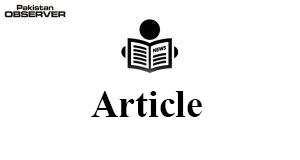Hassam Ahmed Siddiqi
2021 marks 50 years of 1971 Indo-Pakistan war, a war that was lost by Pakistan. Inefficiency of politicians, bureaucracy, establishment and society at large was at full display in the crisis of 1971. Indian involvement in the whole saga clearly highlighted that India was and will continue to remain a foe and would leave no stone unturned to undo Pakistan. The phenomenon of hybrid warfare has added a new dimension to the traditional concept of war and media has become a significant tool in reshaping public opinion.
Misinterpretation of facts, events and history is the neo-normal that states use to target the masses of their adversaries through various psy ops. India has always tried to create doubts about two-nation theory and the practice continues. Youth constitutes almost 65% of population, which India intends to target to spread ideological discontentment to destabilize Pakistan. To celebrate 50-year anniversary of East-Pakistan separation, India has already launched a comprehensive plan in Pakistan to misrepresent the sacrifices of civilian and armed forces of Pakistan in 1971. This plan includes social media platforms, Facebook pages, short films, telefilms, lectures and YouTube videos. Through these mediums, an effort has been made to defame Pakistan’s armed forces, create hatred in the hearts and minds of young generation and falsely portray the character of Pakistani forces in 1971 war.
Moreover, a deliberate attempt is being made to raise questions in the minds of the youth regarding Two-Nation theory, which is the very basis of Pakistan’s creation. While freedom of expression is a notable liberty, we need to be careful about becoming prey to agendas of the enemy. Our adversaries are specifically focusing on the youth while exploiting their lack of understanding of various issues of national importance. It is now the responsibility of Pakistani State and its institutions to strategize its work plan in order to counter India’s agenda and strike back with an aggressive approach keeping in focus India’s internal situation. ‘Blood and Tears’ is a book written by Mr. Qutubuddin Aziz which highlights 170 eye-witness accounts of atrocities committed on West Pakistanis, Biharis and other pro-Pakistani Bengalis.
It states that terror and massacre initiated by Awami League against Biharis took life of almost half a million in less than two months creating an environment of death and horror. This massacre was backed and done on the behest of India as weapons as well as ammunition and armed infiltrators were sent by India into East Pakistan. The secession plan was well conceived before in 1964 when Sheikh and his associates held their first conspirational conclave in Dacca. Name and flag of Bangladesh was coined for the independent Bengali State that was to be established in the (erstwhile} East Pakistan with Indian funds and arms. India’s clandestine financial support to Awami League turned out to be a major factor in party’s influence and its effective organizational apparatus during 1970 elections.
Given India’s track record and especially after coming to power of hard-line BJP government in India, a new wave of hybrid warfare against Pakistan has been started that warrants special attention. Facts of 1971 war need to be presented objectively to highlight conspirators of East Pakistan tragedy. A comprehensive narrative building plan needs to be devised against Indian psychological warfare initiatives, which highlight and focuses on the concepts of Two-Nation theory and Pakistaniat. This plan may include national conferences, roundtables, interactive discussions, telefilms, long and short videos, magazine and newspaper articles, national songs and youth fellowships that can train the young leaders to effectively impact the larger audience within their respective societies.
Biharis are our national heroes whose efforts have not been recognized by the State of Pakistan even after almost five decades. Giving blood in the name of Pakistan must be a sense of honour and pride for every Pakistani and we have to highlight this aspect of nationhood in our young ones by acknowledging and honouring the civil and military war heroes of 1971. This nation and its young blood should be informed about the sacrifices of their ancestors for their motherland. The state must ensure that the youth of Pakistan should never become an easy target to malicious Indian propaganda while the institutions need to play an active role in engaging young blood in promoting the concept of Two-Nation Theory and Pakistaniat.
—The writer is a PhD Scholar/Director Programs PICSS.










